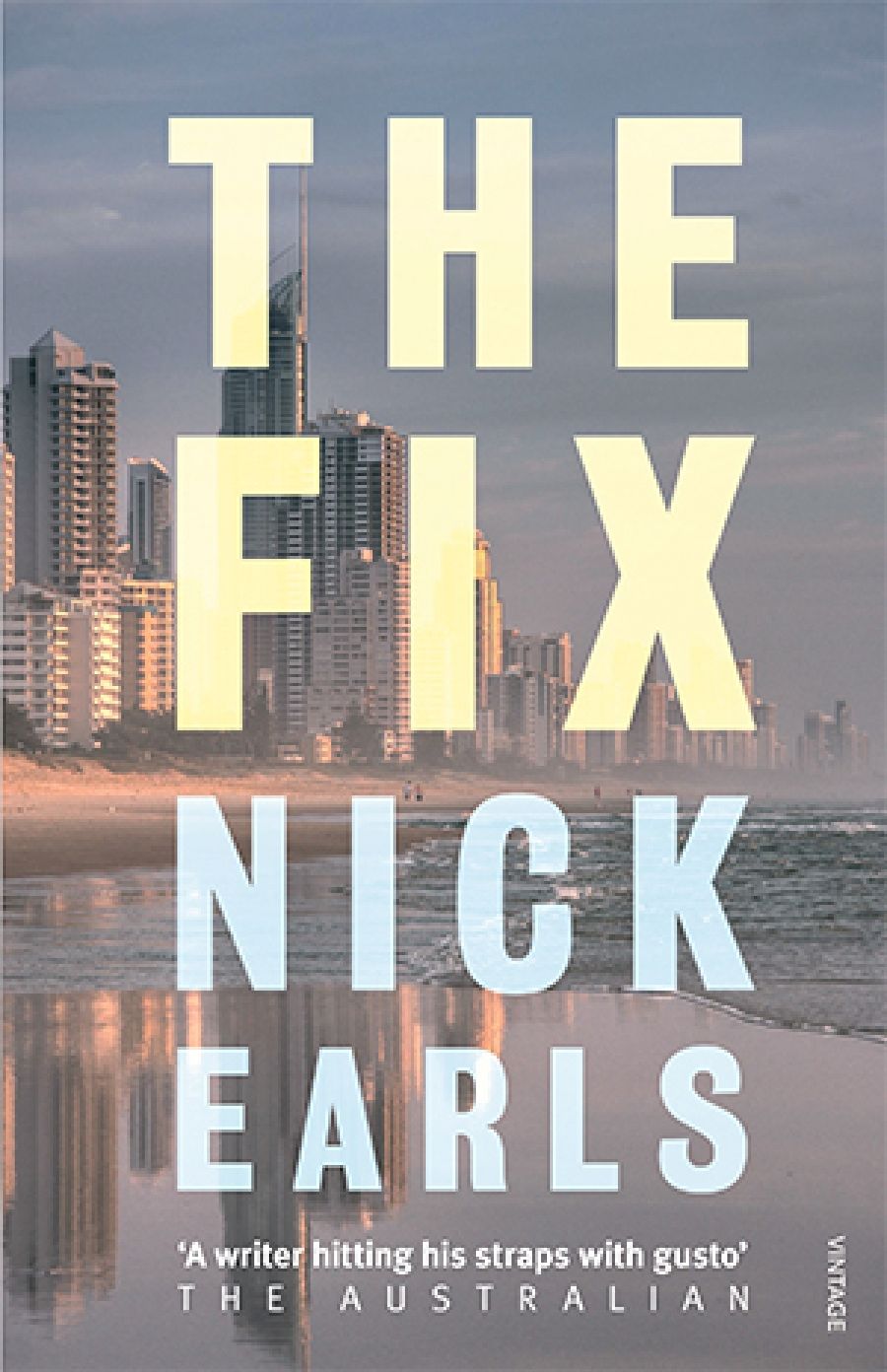
- Free Article: No
- Contents Category: Fiction
- Custom Article Title: Jeffrey Poacher reviews 'The Fix' by Nick Earls
- Review Article: Yes
- Online Only: No
- Custom Highlight Text:
In contemporary crime fiction, first-person narrators can often sound irritatingly implausible, either too much the Marlovian stoic or too much the Holmesian savant. This is not the case with The Fix, Nick Earls’s latest offering, in which the narratorial voice is convincing from the first page. Then again, The Fix is hardly a conventional work of crime fiction; it has some ingredients of the genre (a death, a cover-up, a bit of gunplay), but also a good deal of comedy and single-guy angst. Even more surprisingly, the reliable narrator doing the detective work is not some gumshoe or forensics-lab genius, but – of all things – a lifestyle blogger and part-time spin doctor.
- Book 1 Title: The Fix
- Book 1 Biblio: Vintage, $32.95 pb, 304 pp, 9781864711509
That narrator is Josh Lang, a dorky twenty-eight-year-old Brisbanite who has just returned to his home town after a less-than-glorious stint with a London public relations firm. Prior to his retrenchment, Josh had worked as a ‘fixer’, a ‘manager of perceptions’, the guy who deals with the media if your company is building a toll road through some unspoilt wilderness. Now he lives alone in a modest flat, sleeping late, watching bad television, generally hovering on the edge of loserdom. At university Josh had dreamed of becoming an investigative journalist; now he makes ends meet by writing a ‘Gen Y’ column for a local newspaper, serving up five hundred words a week on hard-hitting topics such as the technical aspects of photocopying one’s buttocks at the office Christmas party.
Out of the blue, Josh is offered some image-fixing work by his insufferable older brother Brett, who has his own PR firm. Their relationship is fraught, largely because of a speech Josh made at Brett’s wedding reception almost a decade earlier (the bride had once been a well-known underwear model, and a random memory of her Bras-’n-Things catalogue photo prompted the half-drunk Josh to share some of his private fantasies with the audience). The job offer is not so much a rapprochement as an act of charity, engineered by Josh’s over-anxious mother. In fact, the trench warfare of family relationships is an important theme running through the novel. Earls has always been good at registering familial embarrassment in all its squirm-making detail, and The Fix continues in this vein, though at times with a decidedly non-comic purpose.
The corporate image that needs fixing belongs to a Brisbane law firm. Twelve months earlier, one of the firm’s clients stormed into its downtown office, brandishing a shotgun and taking two lawyers hostage, before eventually being killed in a struggle over the weapon. Ben Harkin, the lawyer who wrestled with the gunman, happens to have been Josh’s best friend at university, but their friendship ended badly after he slept with Josh’s then girlfriend (that relationship ended badly, too). Ben is now about to be awarded the Star of Courage for his heroic deed, and it is Josh’s unenviable task to ‘handle the press’ for his treacherous ex-pal. In order to field the various media enquiries, Josh becomes, so to speak, embedded with Ben’s law firm, even tagging along to a ‘client development’ night at one of Brisbane’s sleazier strip-clubs. Corporate culture is a dangling piñata for the stick of Earls’s satire, and the scenes set at the Silver Spur are some of the funniest in the novel. Josh takes a fancy to one of the strippers, but it is unclear whether this might develop into anything more serious. In this regard, Josh is his own worst enemy – his first attempt to chat up the stripper quickly degenerates into a blather about the merits of breast augmentation. ‘She was totally eating out of your hand,’ Ben smugly avers.
For some reason, Ben seems an especially reluctant hero and this soon arouses Josh’s suspicions. The story should be a positive one – ‘deranged gunman thwarted by selfless act of bravery’, etc. – but Josh suspects that the law firm is doing some spinning of its own. Yet he cannot help wondering whether his doubts about Ben’s version of events actually spring from a deeper animus – namely, his undiminished resentment of a former friend’s duplicity. The police have long since closed their file, so Josh assumes the role of investigator. ‘This isn’t CSI,’ Ben tells him dismissively, even though the hero story is looking shakier by the minute.
The novel unfolds through Josh’s ceaseless prodding at the mystery of what really happened on the day of the siege. This generates various readerly frissons, in the manner of all good crime fiction – as well as false leads and dirty deeds, there is even a helter-skelter car chase. But The Fix is much more enjoyable for its comic set-pieces. The gaucheries of the Gold Coast are gently mocked, but Brisbane’s corporate high-fliers do not get off so lightly. Josh’s narrative relentlessly skewers the pretensions of those who lord it over him, ranging from their wine snobbery to the way they trumpet their ‘green’ credentials. The satire has real bite here, mainly because the hypocrisy of its targets is so palpable. Nevertheless, it would be wrong to think of The Fix as primarily being some sort of social critique. It does seem the most realistic of Earls’s dozen novels, but that certainly does not detract from its levity. The house of fiction has many mansions, and there is always room for comic writing of such a high order.


Comments powered by CComment